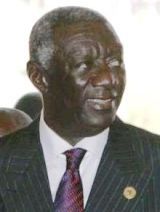Sudan loses African leadership post over Darfur
Jan 29, 2007 (ADDIS ABABA) — Sudan lost the leadership of the African Union for a second time after the pan-African group on Monday awarded the rotating chairmanship to Ghana because of widespread outrage over continuing bloodshed in Darfur.

He said Sudan had supported the decision, which avoided a damaging dispute eclipsing issues on the summit agenda including raising peacekeeping troops for Somalia.
Before the summit some analysts had predicted the dispute over Sudan would dominate the summit and only be resolved at the last moment.
Delegates at the summit said a deal was worked out through the mediation of South African President Thabo Mbeki and a group of seven respected presidents or “wise men”.
The 2007 chairmanship was promised to Sudanese President Omar al-Bashir a year ago when he was passed over for the post because of the violence in Darfur, which experts estimate has killed 200,000 people and driven 2.5 million from their homes.
Critics say that far from abating, the violence has worsened in the last year and government-backed Arab militias have killed thousands. Bashir has repeatedly blocked deployment of U.N. peacekeepers to bolster an overstretched African Union military mission of 7,000 soldiers and monitors.
Egyptian Foreign Minister Ahmed Aboul Gheit told reporters: “Sudan attended this meeting and the presidency went to Ghana. Sudan withdrew.”
UNDER FIRE
Sudan had seemed adamant on the eve of the summit that it should get the chairmanship despite a chorus of demands from rights organisations and Western governments that it be snubbed because of abuses in Darfur.
But as the summit began in the Ethiopian capital, pressure rose to prevent Sudan from running the organisation whose peacekeepers are charged with stemming the violence in its vast west.
In his opening speech, Konare accused Khartoum of attacking civilians in Darfur, where the United States says genocide has occurred.
“We appeal to the government of Sudan to stop attacking and bombarding Darfur and instead restore peace,” he said.
Rights group Amnesty International said in a statement on the eve of the two-day summit that the AU would undermine its credibility if it gave the chairmanship to Bashir.
Chad, whose relations with Sudan are severely strained after the Darfur conflict spilt over their border, had vowed to withdraw from the AU if Bashir got the chair.
Diplomats said Western governments lobbied vigorously in Addis Ababa against Sudan and had earlier suggested Tanzania might be a compromise candidate.
Delegates said there had been trenchant opposition to Sudan from some of the governments and a compromise over Ghana, which is celebrating the 50th anniversary of its independence in 2007, offered a way out of the dilemma supported by consensus–the traditional African way of resolving disputes.
“How can you ask someone who is dealing with their own internal conflict to deal with all the other issues going on the continent?,” one African delegate said.
The Addis Ababa meeting is also due to discuss raising a peacekeeping force for Somalia to replace Ethiopian troops, unrest in Guinea and climate change, as well as the AU military mission in Darfur.
(Reuters)
